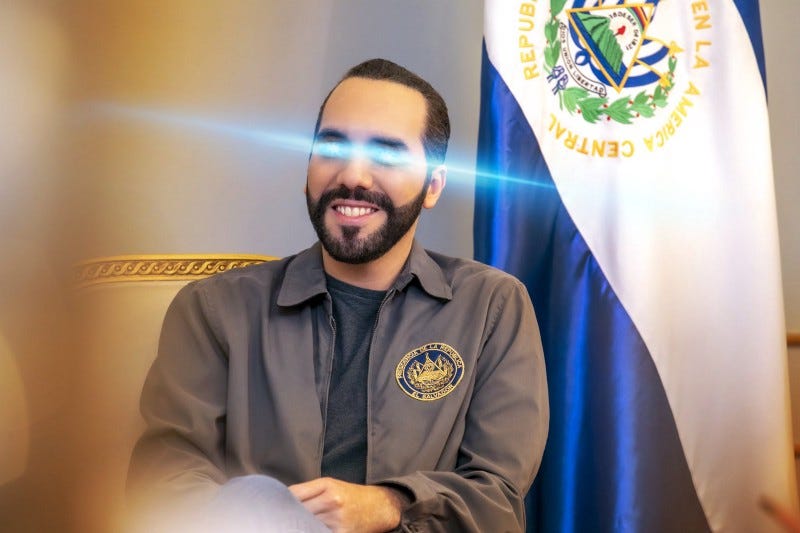Bitcoin Is Now Legal Tender
The first nation to officially adopt cryptocurrency is El Salvador
The first nation to officially adopt cryptocurrency is El Salvador

A few years ago, I took a month-long publishing course at the University of Oxford. It was glorious: British meals in a Hogwarts-style dining hall. Late-night saunters to the pub where C.S. Lewis used to meet with J.R.R. Tolkein and the Inklings. Rooftop drinks with the editor who published Harry freaking Potter.
My classmate in the seat beside me was from El Salvador. I could tell he was from money. One night, in the depths of some underground scotch bar, I asked him about it. “My dad was in pharmaceuticals and then in television. Now we’re in politics.”
I Googled him when I got back to my dorm. His brother was the thirty-something, progressive, well-loved mayor of San Salvador. By the looks of things, he was killing it — cleaning up the streets, preventing crime, raising people out of poverty, all the good stuff you pray from good leadership.
I caught up with my classmate the next day. “Dude!” I said. “If your brother doesn’t get assassinated, he’s going to be the next president of El Salvador.”
He grinned and shook his head. “Yeah right!”
Fast forward three years
Nayib Bukele is now President of El Salvador with a near 90% approval rating, and, this morning, his country just became the first on earth to make Bitcoin legal tender.
He’s either a madman or a total genius.
Either way, he’s about to become world-famous.
Sixty-two members of the Salvadoran Congress voted in favor of the Bitcoin bill, with 19 opposed and three abstentions, meaning Bukele won a supermajority for a bill that will mandate all businesses to accept bitcoin for goods or services, and allow citizens to pay their taxes in BTC.
Bukele pitched the move as a way to increase financial inclusion in a nation where less than a third of citizens have access to banks and the official currency is the wildly-debased U.S. dollar.
And, unlike China, he’s not planning to force his people to use a government-issued wallet.
In an exceptionally shrewd move aimed and increasing foreign investment, El Salvador will now grant permanent residency to any individual who invests 3 BTC in the economy (roughly $100,000–$150,000 depending on the day.)
Considering Bitcoin will no longer be taxed at capital gains rates in El Salvador, it might attract any number of wealthy international Bitcoin holders.
Perhaps the riskiest part of the new law is Bitcoin’s wild price fluctuations. The Salvadoran government has promised businesses they will act as a backstop for companies that don’t love the volatility, by setting up a $150 million trust at the national Development Bank.
It’s the kind of move that could prove brilliant, or could see the whole fund wiped out in one day as whales continue to manipulate the price of $BTC. (It also remains to be seen whether or not the USA will even allow it to happen, wielding proxy power via the IMF to bludgeon El Salvador back onto the dollar standard.)
“The purpose of this law is to regulate bitcoin as unrestricted legal tender with liberating power, unlimited in any transaction, and to any title that public or private natural or legal persons require carrying out.” — Nayib Bukele
As long-term readers/fans/haters know, I’m a huge fan of blockchain technology, and also a roaring bear against Ponzi-style cryptocurrency speculation, because I don’t want millions of unsophisticated “investor”-gamblers to lose their family’s real-world wealth.
That said, I’m also against violence-backed currencies that are manipulated by elite powers for private gains. For years, the fiat $USD has crushed emerging markets like El Salvador by printing money and destroying purchasing power.
There’s now a breach in the American Dollar dominance wall.
Salvadorans can now connect directly to people and companies around the world without the high cost of transfers or remittances, rapidly attract capital, and pay for global goods and services with a non-depreciating frictionless currency.
If the move proves successful in El Salvador, the entire financial world could quickly transform as other nations follow suit.
President Bukele’s aim is noble: To stabilize his fledgling nation’s economy by weaning it off of its dependence on the highly corrupted American dollar. As his bill states:
“In order to mitigate the negative impact from [overseas] central banks, it becomes necessary to authorize the circulation of a digital currency with a supply that cannot be controlled by any central bank and is only altered in accord with objective and calclable criteria.”
Instead of cryptocurrency being treated like a giant Ponzi scheme, we’ll now get to see what it looks like in an actually useful real-life scenario.
President Bukele added personally: “In the medium and long term, we hope that this decision can help us push humanity, at least a tiny bit, in the right direction.”
Here’s to hoping he survives the inevitable “coup attempt” to see it through.
Follow Jared on Medium + subscribe to Surviving Tomorrow.

